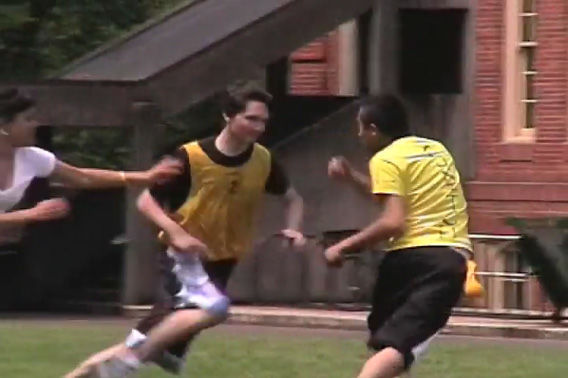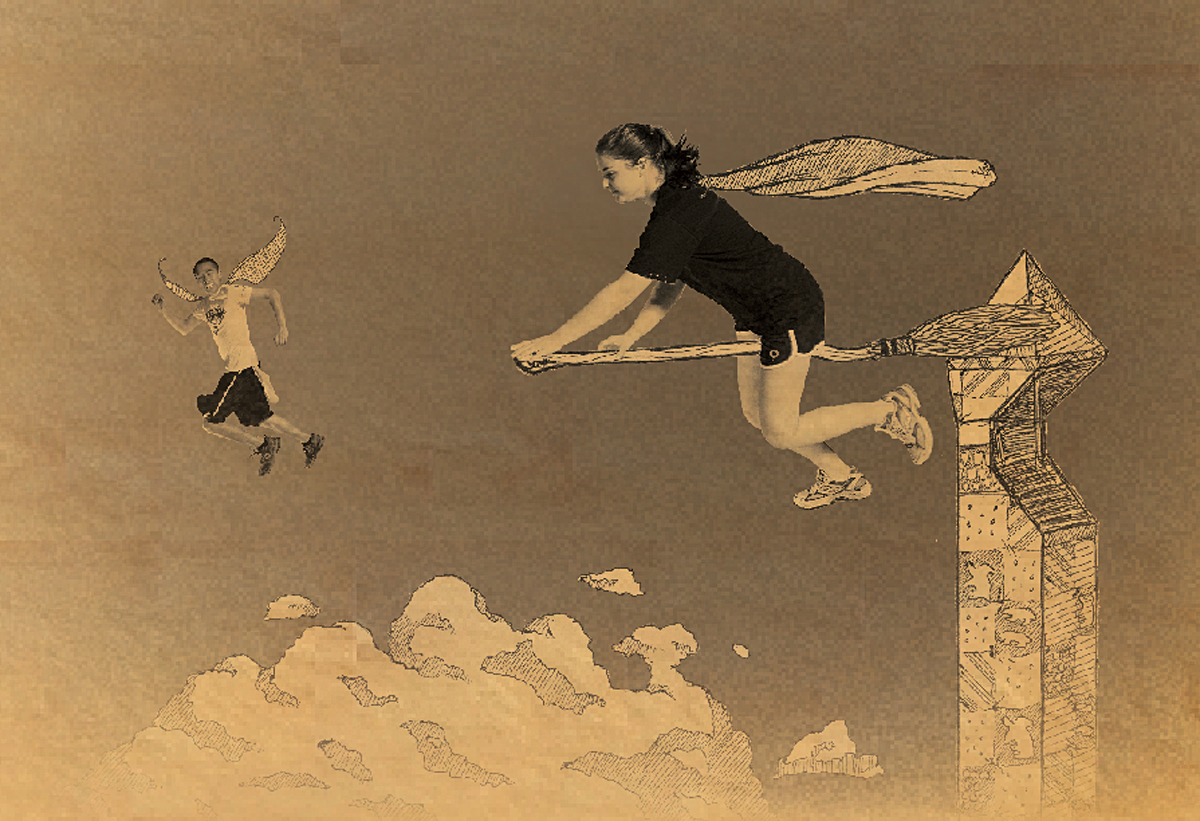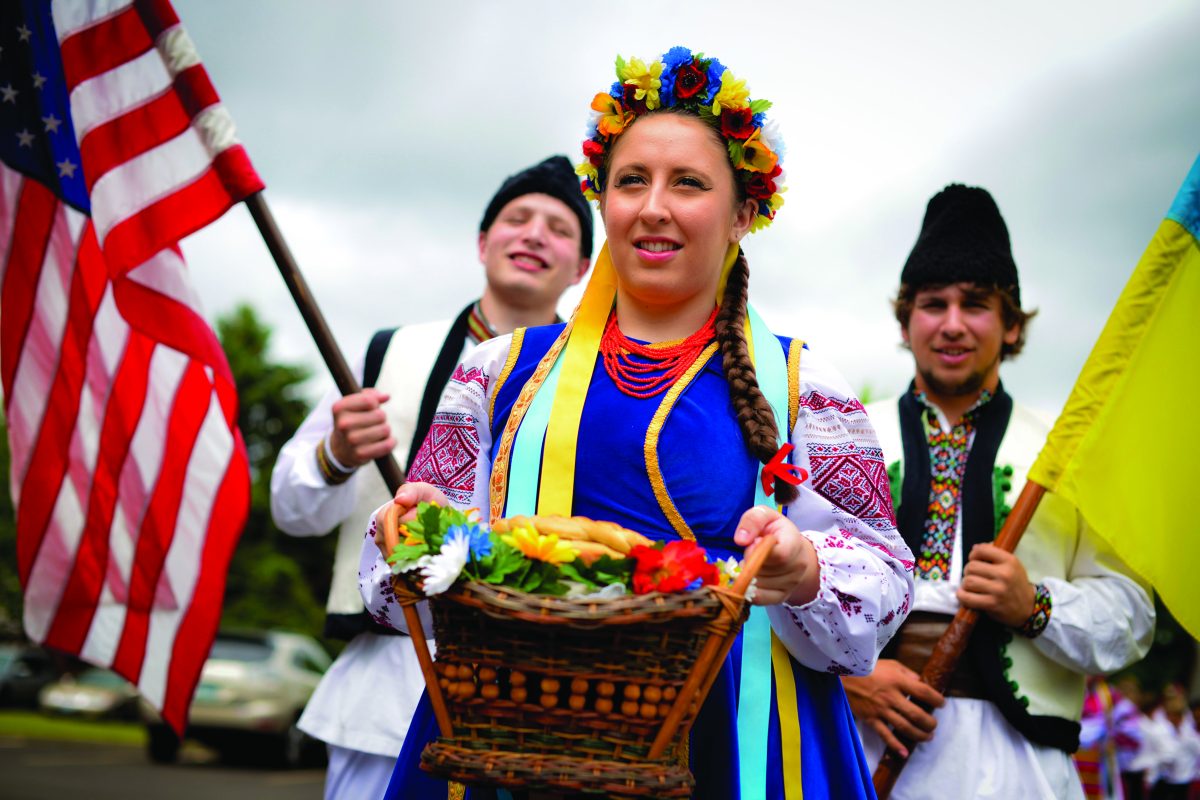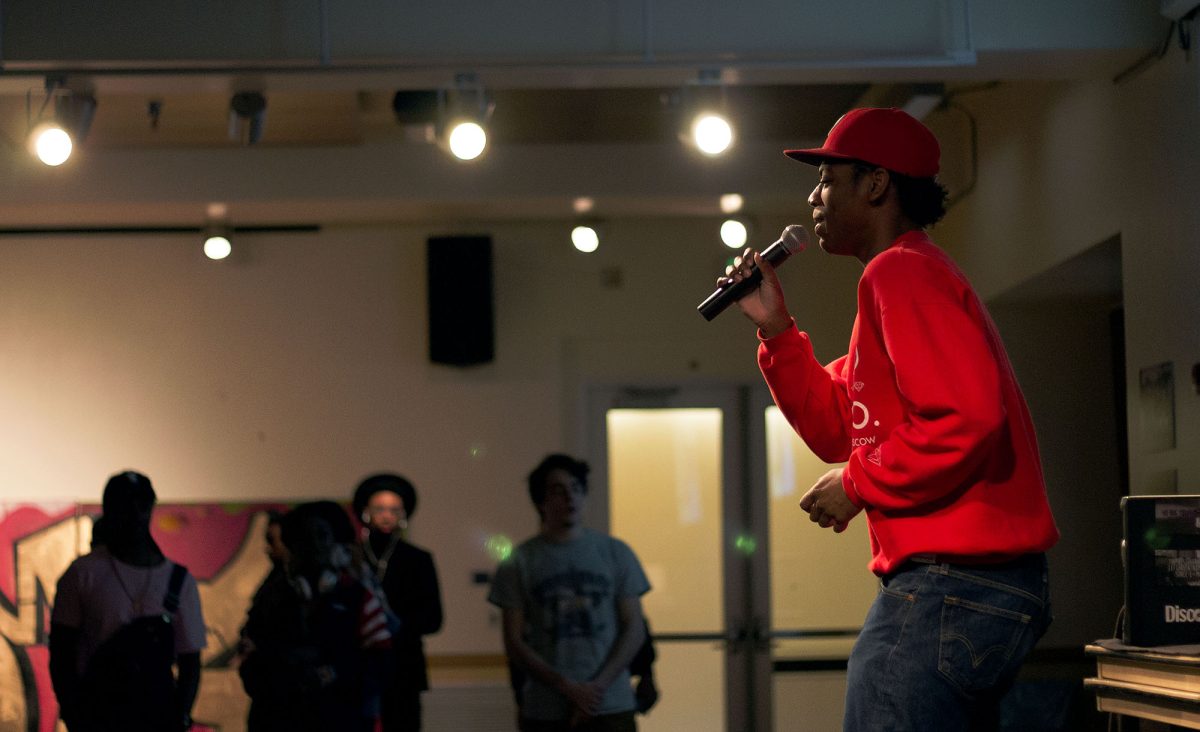Muggle Quidditch flies off the pages of Harry Potter into the campus arena.
Story by Kasandra Easley
Photo Illustration by Cam Giblin, Sarah Hewett, and Wesley Thompson
Multimedia by Chelsea Vadakin
The burning, stinging sensation throbs through the Chaser’s gangly body. Dressed from head to toe in shades of black, the pain pulsates at the epicenter of impact: his shoulder. Each game, his body becomes a tool for deflecting flying balls and striking fellow players as he dashes through the field toward a homemade goal post.
Video
Charging through the mass of people, each player fights for possession of the partially deflated volleyball. Lowering his head and squaring his shoulders, the athlete plows through the hoard of bodies from the opposing team; he has one objective in mind. Leading the scoreboard, the Chaser seizes the opportunity for his team to pull ahead. Eyes on the prize, he catapults the Quaffle into the hoop.
Nearing the goal, he wipes his palms, gritty from sweat and dirt. He tightens the grip between his shaky hands; it’s tied at 40-40 and the game is resting on this shot. His shot. Breathing in deep, he jogs toward the goals, timing his stride perfectly to launch it in at just the right moment. The crowd roars; Muggles everywhere rejoice. Finally, Quidditch can be played by all.
Played on college campuses across the United States, Quidditch, the fictional sport of J.K. Rowling’s Harry Potter, is attracting droves of wannabe wizards and witches to join — including those at the University of Oregon. And despite the lack of magical powers and ability to fly, “Muggle Quidditch,” as played by non-magical people, feels almost as quick-paced as Hogwart’s matches.
Around the world, 226 teams make up the International Quidditch Association (IQA). Since its establishment in 2007, the IQA’s World Cup in Middlebury, Vermont, has aired on major news networks including CBS and ESPN. And while the fledgling UO Quidditch team hopes to one day make it to the coveted World Cup, for now, they are working toward recruiting more members and being officially recognized by the university’s associative student body.
A mix between rugby, basketball, dodgeball, and flag football, Muggle Quidditch has a little bit of everything for everyone minus magic broomsticks. And keeping in mind there is no healing magic, a first-aid kit is highly recommended. More often than not, it comes in handy amidst the chaos.
How to Play Muggle Quidditch
According to the official IQA rulebook, teams need at least seven members playing at all times. Including substitutes, who can sub in at any time, each team can have up to twenty players. And while the positions sound self-explanatory — Chaser, Beater, Keeper, Seeker — in reality, the logistics of how each position is played is as awkward and confusing as you would expect a pseudo magical sport to be.
Chasers
The main scorers, Chasers are the fastest and most nimble members of the team. The three Chasers spend the majority of the game trying to score by throwing the Quaffle, a deflated volleyball, through one of three makeshift goalposts on their opponent’s side. The goalposts vary in height and are often constructed out of a Hula-Hoop duct-taped to a PVC pipe. Chasers can also steal the Quaffle from opposing Chasers through tackling, intercepting, grabbing — just about anything goes. Chasers score ten points for every goal — that is, if they can avoid being struck out by the Beaters first.
Beaters
Armed with dodgeballs called Bludgers, Beaters temporarily tap out and disarm opposing players. For Chasers, this means losing the Quaffle while Beaters from the opposing team must drop their Bludger. Empty-handed? Get ready to run — the penalty for getting tagged is a lap around all three respective goal posts. And with two Beaters per team and three Bludgers total, the team with the extra Bludger always has the advantage. In terms of muscle power, in Muggle Quidditch, Beaters are the playmakers.
Keeper
As guardian of the goals, the Keeper is the most versatile member of a Quidditch team. Protecting the posts from relentless Chasers. Keepers tend to stick close to the goalposts, tackling, swatting away, and using their bodies to block the Quaffle. However, if the opportunity strikes, each Keeper can leave their post and assume the role of Chaser. Quaffle in hand, a Keeper can score just like a Chaser — but also be tagged out like one. Thus, while Keepers have the freedom to choose between offensive and defensive plays, an unsuccessful run for a goal may leave its own team out of a goalie.
Seeker and the Snitch
Besides the inability to whiz around on broomsticks, there is one distinguishing characteristic between magical and non-magical Quidditch: the Snitch. A substitute for the book’s magical, winged Golden Snitch, the Muggle Snitch is just that — a Muggle. Not affiliated with either team the Snitch, usually a track-team member clad in bright yellow, runs around with a sock-wrapped tennis ball hanging by the elastic waistband of his or her shorts. With the start of the whistle, the Snitch has two minutes to run and hide somewhere on campus. After the time is up, the Seekers from each team have ten minutes to find the Snitch and grab the sock. If ten minutes elapse and the Seekers remain sockless, both Seekers and Snitch must return to the field. Catching the Snitch just got a whole lot easier.
The game ends when a Seeker seizes the sock off the Snitch. And while the team that catches the Snitch receives an extra thirty points, it doesn’t guarantee a victory. In both Harry Potter and Muggle Quidditch, it’s possible to catch the Snitch and still lose the game, depending on each team’s total score.
Talk about keeping your eye on the ball.
On a sunny day during spring term 2010, the University of Oregon Quidditch team took to Gerlinger lawn for its weekly match. With Hula-Hoop goals and deflated dodgeballs for optimum grip at the ready, these local Muggles began their version of the famous fictional game.
“People are really friendly on this team so everyone’s comfortable with tackling someone or just grabbing someone else and trying to wrestle the ball away,” says University senior and team member Adrian Ho. “The team bonds really fast no matter if you just came off the street to join us.”
Started two years ago, the team has both a Facebook page and Twitter feed to send out bulletins of upcoming events and invites for people to join the ever-expanding team. New Muggles are encouraged to join.
“We play rain or shine, no matter what the weather is,” Ho says.
See the team at practice in UO’s Muggle Quidditch League.





















